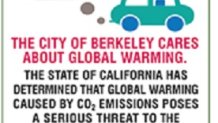First, they took on big soda – and won. Now, Berkeley is poised to tackle big oil.
The City Council is scheduled to vote Tuesday night on whether to move forward with a plan that could make the city the first in the country to require gas pumps to warn customers that burning fuel contributes to climate change. They will vote on whether to draft an ordinance within the next three months, knowing full well they will likely be sued by the Western States Petroleum Association.
"I think the science is clear we have to reduce buying gasoline and treat it as though it's a neutral activity," said Jack Fleck, a member of 350BayArea.org, which has been spearheading this issue. "Consuming gasoline is causing climate change. It's a serious problem."
For the record, Fleck drives a Chevy Volt powered with solar panels

The oil-industry lobbying group has already told the Berkeley Energy Commission the fuel station carbon dioxide labels "violate the First Amendment’s prohibition against compelled speech.”
But Berkeley has battled industries successfully before. Most notably, Berkeley became the first city in the nation on Nov. 4 to pass a city law taxing sodas, 1 cent per ounce. San Francisco also tried such a measure and lost, but like Berkeley, is considering a similar gas pump warning labeling measure. On Thursday, a committee in San Francisco is expected to vote on a draft of an ordinance, which the Board of Supervisors could vote on by next spring.
"We get sued all the time," Berkeley Mayor Tom Bates said with a laugh. Berkeley hasn't been sued by the soda industry yet, but that will happen in the near future. That's not a reason not to fight the good fight, he said.
U.S. & World
"This is just a friendly reminder," he said of the stickers. "It's just information for consumers."
Not all are enamored with the Berkeley labeling proposal, which is estimated to cost $20,000 to set up the first year - not to mention the unknown costs that would need to be spent on fighting the highly likely oil industry lawsuit, according to city documents.
Fred Schlachter, a Berkeley energy commissioner, wrote a dissenting opinion arguing that the global warning labels are a "well meaning and sincere attempt to increase social awareness of the well-known link between combustion of gasoline and the release of carbon dioxide into the atmosphere."
But, he argued that "there is a possibility of an adverse reaction, as some citizens will no doubt not like being preached to when fueling their cars." He said that Berkeley drivers may have such a negative reaction to being "lectured at the pump," they may choose to fill up elsewhere.
He also added that fueling up isn't generally a "moment of choice," it's a decision between filling up or running out of gas.
Still, the labeling proposal passed unanimously this summer at an advisory committee level. Those who like the idea say the labels will bring awareness, and hopefully, lack of use. They liken the effort to warnings on cigarette packages, “click-it-or-ticket” billboards for use of seat belts, alcohol consumption and nutrition labels on packaged food. And, as Fleck pointed out, the labels are just one small piece of a "massive campaign" to stop global warming.
The grand goal of the labels, the supporters argue, is to reduce the city's greenhouse gas emissions – 50 percent of which come from transportation in Berkeley – by 33 percent between 2000 and 2020.



